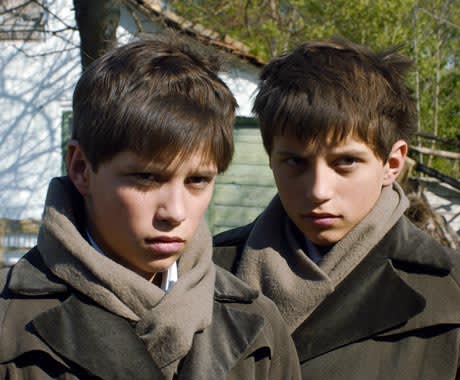Stripped down to its fundamentals, János Szász's strikingly cruel and unrelentingly misanthropic deconstruction of wartime psychology, The Notebook, is the sort of fable the Grimm Brothers might have penned had they been alive during WWII. It's also thematically indicative of Szász's sparse yet pointed career trajectory in cinema, assessing the emotional and physical repercussions of protracted suffering and torture on one's mental state, much like his adaptation of Büchner's play, Woyzeck, back in 1994.
Here, exacerbating the harshness of the underlying implications, the protagonists are children, twin brothers (Andras and Laszlo Gyemant) sent to live with their estranged grandmother (Piroska Molnar) in the countryside after their father is called to join the front in the early days of WWII. Forced into intense labour, starved and deprived of any sort of affection, they adapt to their new situation through intense willpower and self-punishment. They regularly beat each other, starve themselves and engage in other increasingly intense and morally abject modes of strengthening the self, gradually becoming cold, calculating strongholds, guarded from the onslaught of horrors the world has to offer them.
Though the material is decidedly bleak, Szász is careful to maintain a darkly comedic — occasionally sick — tone, ensuring the story plays as a fable of sorts. The boys keep the titular "notebook," documenting their progress in self-preservation, making an ersatz game out of manipulating and mentally exhausting their tough-as-nails, unrelentingly austere grandmother, which is a tactic they bring to most of their interactions. This weirdly playful dynamic adds a sense of levity to what is otherwise horrifying, removing enough reality from what's being presented to evade oppressive intensity.
If there is a fault to this sociopathic coming-of-age, it's that the young actors are unable to demonstrate any sort of range or emotional evolution, having the same blank look during their early, "innocent" days as they do when they eventually look to physical cruelty as a source of amusement. Still, even without this dimension, their actions speak for themselves, as do the litany of surmounting atrocities unfolding around them.
The implication that war creates a disconnect from humanity isn't particularly groundbreaking in itself, but Szász is interested in examining more than this broad observation. Removed from their basic moral obligations — obligations that traditionally stem from a sense of community and social performance — every character is given the liberty to indulge in their id-driven impulses. As such, the hints at paedophilia, presentation of exaggerated salaciousness and sadistic actions merely reiterate the overriding social climate. In a microcosm of implicit hate and conflict, there's no reason for anyone to uphold pretences, which, when compounded by the effects people have on each other, escalates the collective sense of ethical dubiousness.
It's here where The Notebook holds its power and extracts some kernels of wildly unflattering truth from the human condition. In addition to detailing how rapidly environmental signifiers can modify psychological make-up, he's also revealing just how fragile the very nature of civility really is.
(Mongrel Media)Here, exacerbating the harshness of the underlying implications, the protagonists are children, twin brothers (Andras and Laszlo Gyemant) sent to live with their estranged grandmother (Piroska Molnar) in the countryside after their father is called to join the front in the early days of WWII. Forced into intense labour, starved and deprived of any sort of affection, they adapt to their new situation through intense willpower and self-punishment. They regularly beat each other, starve themselves and engage in other increasingly intense and morally abject modes of strengthening the self, gradually becoming cold, calculating strongholds, guarded from the onslaught of horrors the world has to offer them.
Though the material is decidedly bleak, Szász is careful to maintain a darkly comedic — occasionally sick — tone, ensuring the story plays as a fable of sorts. The boys keep the titular "notebook," documenting their progress in self-preservation, making an ersatz game out of manipulating and mentally exhausting their tough-as-nails, unrelentingly austere grandmother, which is a tactic they bring to most of their interactions. This weirdly playful dynamic adds a sense of levity to what is otherwise horrifying, removing enough reality from what's being presented to evade oppressive intensity.
If there is a fault to this sociopathic coming-of-age, it's that the young actors are unable to demonstrate any sort of range or emotional evolution, having the same blank look during their early, "innocent" days as they do when they eventually look to physical cruelty as a source of amusement. Still, even without this dimension, their actions speak for themselves, as do the litany of surmounting atrocities unfolding around them.
The implication that war creates a disconnect from humanity isn't particularly groundbreaking in itself, but Szász is interested in examining more than this broad observation. Removed from their basic moral obligations — obligations that traditionally stem from a sense of community and social performance — every character is given the liberty to indulge in their id-driven impulses. As such, the hints at paedophilia, presentation of exaggerated salaciousness and sadistic actions merely reiterate the overriding social climate. In a microcosm of implicit hate and conflict, there's no reason for anyone to uphold pretences, which, when compounded by the effects people have on each other, escalates the collective sense of ethical dubiousness.
It's here where The Notebook holds its power and extracts some kernels of wildly unflattering truth from the human condition. In addition to detailing how rapidly environmental signifiers can modify psychological make-up, he's also revealing just how fragile the very nature of civility really is.




